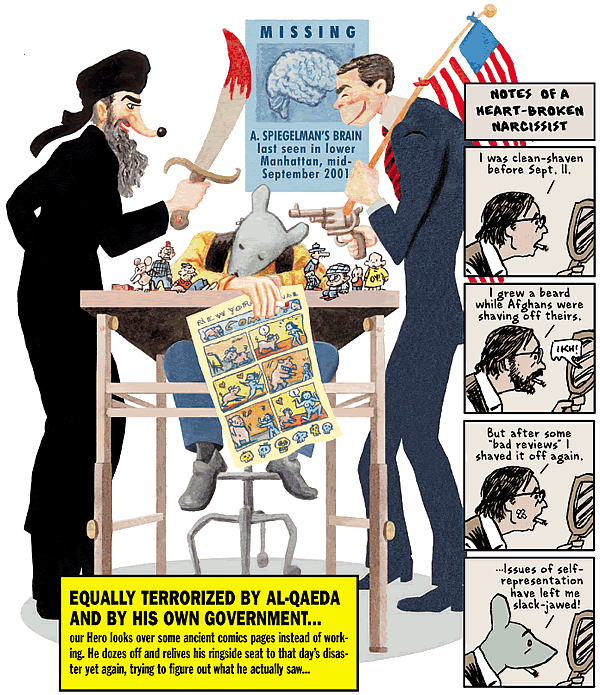
The comic strip has been serialized by Die Zeit, The Forward, and the London Review of Books.
As you may recall, Spiegelman resigned from The New Yorker "in protest at what he calls 'the widespread conformism of the mass media in the Bush era'":
Art Spiegelman decided to leave The New Yorker in protest at what he calls "the widespread conformism of the mass media in the Bush era."By now, both The New Yorker and the New York Times, as well as many other corporate media outlets, have become able to criticize the Bush administration, but that is only because it has become very clear -- at least since last October -- that the occupation of Iraq is not a piece of cake, and the ruling class has dumped Bush. I applaud Spiegelman for his courage of conviction, refusing to compromise with the prevailing tone of deference to authorities when it was still very difficult to defy it in the wake of the terrorist attacks.
"The decision to leave was mine alone," the author of Maus, (the saga of Jewish mice exterminated by Nazi cats that won him the Pulitzer Prize -- the first ever awarded for a comic book), explained in an interview with Corriere della Sera. "The editor of the The New Yorker, David Remnick, was shocked when I announced my resignation. He attempted to dissuade me. But I told him that the kind of work that I'm now interested in doing is not suited to the present tone of The New Yorker. And seeing that we are living in extremely dangerous times, I don't feel like stooping to compromise."
(Q) Do you consider yourself a victim of September 11?
"Exactly so. From the time that the Twin Towers fell, it seems as if I've been living in internal exile, or like a political dissident confined to an island. I no longer feel in harmony with American culture, especially now that the entire media has become conservative and tremendously timid. Unfortunately, even The New Yorker has not escaped this trend: Remnick is unable to accept the challenge, while, on the contrary, I am more and more inclined to provocation."
(Q) What kind of provocation?
"I am working on the sixth installment of my new strip, 'In the shadow of no tower,' inspired both by memories of September 11 -- on that day, I had just left my apartment, a few steps from the tragedy -- and a present in which one feels equally threatened by both Bush and bin Laden. The series was commissioned by the German newspaper Die Zeit, but here in the USA, only the Jewish magazine The Forward has agreed to publish it."
(Q) Did you feel snubbed by the refusal of The New Yorker to publish it?
"Not at all. I knew from the beginning that the tone and content of the strip -- which, at this point in time, is of most importance to me -- were not in harmony with The New Yorker. A wonderful magazine, mind you, with delightful and refined covers, but also incredibly deferential to the present administration. If I were content to draw harmless strips about skateboarding and shopping in Manhattan, there would have been no problem; but, now, my inner life is inflamed with much different issues."
(Q) For what do you reproach The New Yorker?
For marching to the same beat as the New York Times and all the other great American media that don't criticize the government for fear that the administration will take revenge by blocking their access to sources and information. Mass media today is in the hands of a limited group of extremely wealthy owners whose interests don't coincide at all with those of the average soul living in a country where the gap between rich and poor is now unbridgeable. In this context, all criticism of the administration is automatically branded unpatriotic and un-American. Our media choose to ignore news that in the rest of the world receives wide prominence; if it were not for the Internet, even my view of the world would be extremely limited." ("Art Spiegelman, "Cartoonist for The New Yorker, Resigns in Protest at Censorship," Corriere della Sera (Milan), February 13, 2003)




No comments:
Post a Comment